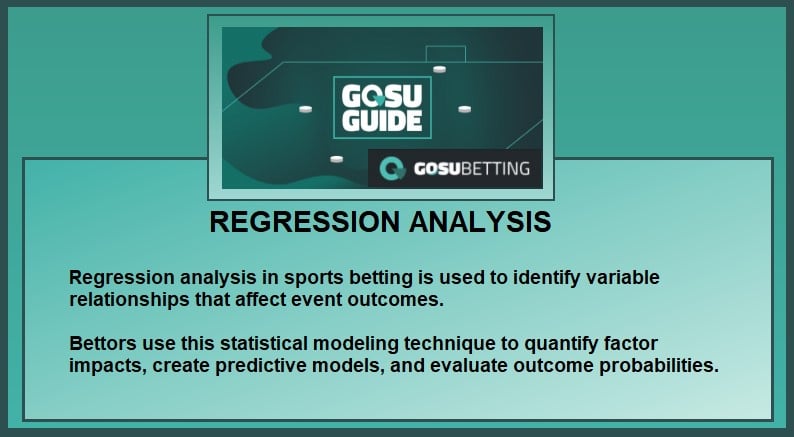Welcome to an in-depth guide on regression analysis, a powerful statistical tool used to model the relationships between variables in sports and to predict outcomes. This article explains how this technique can be used to identify the factors that influence results, build predictive models, and gain an edge in sports betting.
With a good grasp of regression analysis, bettors can move from a position of speculation to a position of informed analysis.
What is Regression Analysis?

Regression analysis is a statistical technique for modeling the relationship between a dependent variable (the outcome you’re trying to predict, e.g., game score or final result) and one or more independent variables (factors that might influence the outcome, e.g., team statistics, player performance metrics, etc.).
Key Components of Regression Analysis
Let’s take a look at the building blocks of regression analysis:
- Dependent Variable: The outcome you are trying to predict, for example, a team’s win/loss record, the number of goals scored, or a players ranking.
- Independent Variables: Factors you believe will impact the dependent variable, such as a team’s past performance, a player’s statistics, or weather conditions.
- Linear Regression: A type of regression analysis that assumes a linear relationship between the variables. For each unit increase in X, there will be a predictable increase (or decrease) in Y.
- Multiple Regression: A more complex type of regression analysis that uses multiple independent variables to predict the dependent variable.
- Logistic Regression: Used when the outcome is a categorical variable (e.g., win or loss). Logistic regression will model the probability of the selection reaching a specific outcome.
How Can We Apply Regression Analysis in Sports Betting to Realise the Benefits?
Now we know what regression analysis is, we can move on to how we practically apply the methods which give us ways of:
- Identifying Influential Factors: Determining which factors have the most impact on the outcome.
- Predicting Outcomes: Building models to forecast results and identify value opportunities in betting markets.
- Quantifying Relationships: Assessing the strength and direction of the relationship between different variables.
- Model Fitting: Implementing techniques for model improvement and refinement.
- Risk Management: Using regression models to make risk-informed decisions.
Evaluating Regression Models
There are several useful evaluation tools or mechanisms for assessing the validity of a regression model:
- R-squared: A statistical measure of how well the model explains the variance in the outcome variable. The greater the percentage, the more of the variance is accounted for by the independent variables within the model.
- Adjusted R-squared: A modified version of R-squared that is used when there are multiple independent variables. This measure helps to avoid over-fitting models that have many predictor variables.
- Avoiding Overfitting: A key concern when building models, that must be avoided to ensure the accuracy of the results. This can be achieved through model validation and the proper implementation of statistical best practices.
- Avoiding Underfitting: Models should not be too simplistic and should attempt to capture the majority of relevant trends and patterns in the data set.
Improving Regression Analysis
These best practice steps can help with regression analysis improvement:
- Feature Engineering: Carefully selecting, transforming or creating new data features to improve model accuracy.
- Data Quality: Ensure data that is used is both accurate and relevant.
- Model Validation: Use cross-validation techniques to evaluate the model on new data, which will protect against data leakage and over-fitting of the model.
Conclusion
Regression analysis is a powerful analytical tool for sports bettors, providing a clear advantage through its ability to model complex relationships and predict outcomes.
By employing these techniques, you can improve your betting process and gain a demonstrable advantage.
However, these tools should be employed with care and should be subject to appropriate validation techniques. When used correctly, regression analysis will offer demonstrable value to your betting process.
If you want to implement some form of regression analysis in your betting efforts, you’ll need a trusted sportsbook. If you’re betting with crypto, you’ll need to use a trusted crypto sportsbook. The GOSUBetting list of recommended crypto sportsbooks below is a good starting point:
Top Bitcoin Betting Sites
BC.Game
Welcome Bonus: Four-part deal up to $1,600
18+ – Gamble responsibly – GambleAware.org – T&C’s apply




